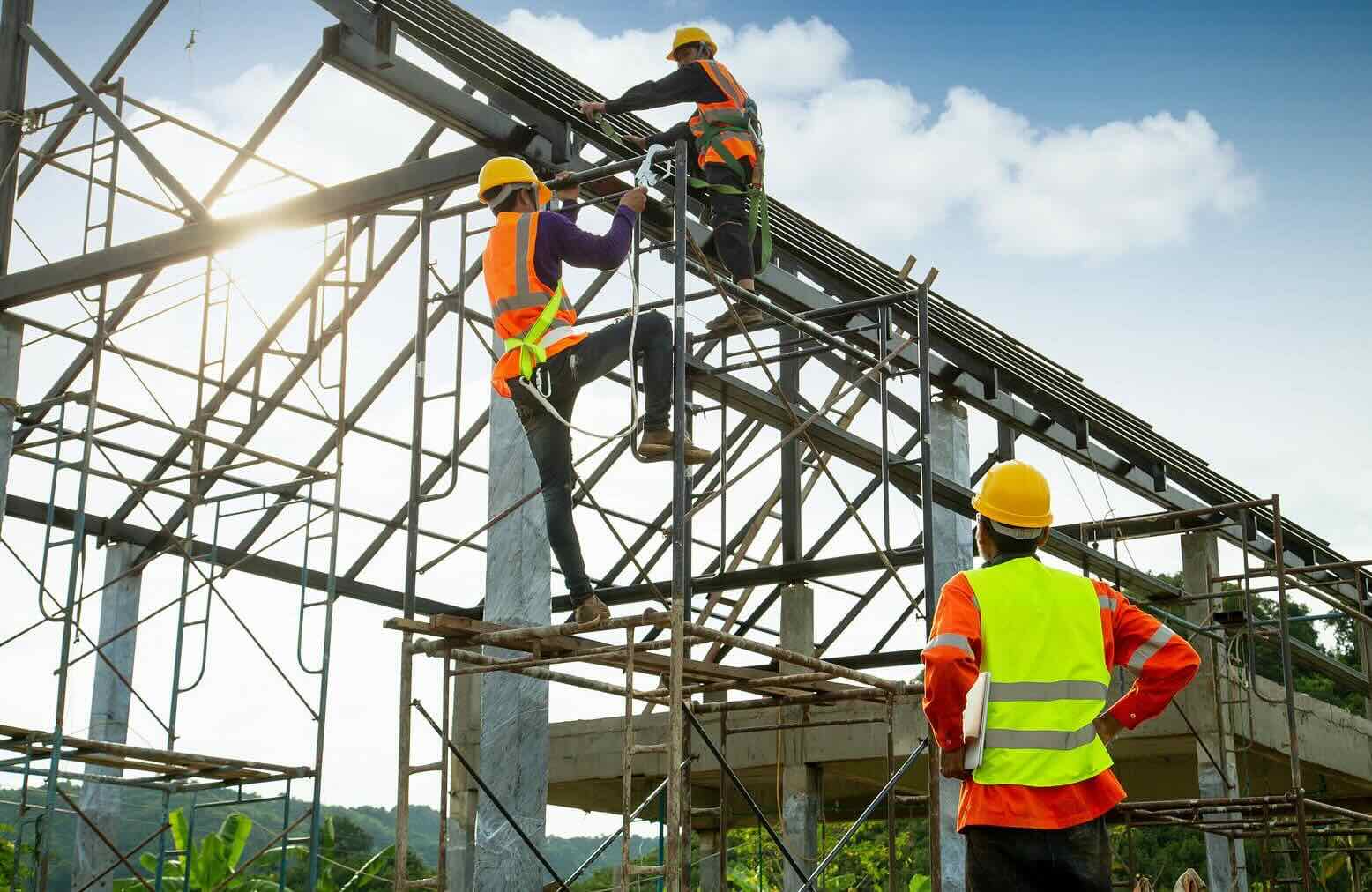Home>diy>Building & Construction>How Does Contracting Construction With The Government Work


Building & Construction
How Does Contracting Construction With The Government Work
Modified: January 9, 2024
Learn how contracting construction with the government works and gain insight into the process of building-construction projects. Discover the steps and requirements involved in this comprehensive guide.
(Many of the links in this article redirect to a specific reviewed product. Your purchase of these products through affiliate links helps to generate commission for Storables.com, at no extra cost. Learn more)
Introduction
Welcome to the world of contracting construction with the government! If you’re a builder or construction company looking to expand your business and take on new projects, government contracts can provide a lucrative and stable source of work. However, navigating the complexities of government procurement can be a daunting task if you’re not familiar with the process.
In this article, we will dive into the basics of contracting construction with the government. We’ll explore how to find government contract opportunities, understand the bidding and solicitation process, prepare and submit bid proposals, and manage government construction contracts once awarded. We’ll also discuss compliance with government regulations and requirements, handling project changes and modifications, managing payment and financial considerations, and finally, the contract closeout and evaluation process.
Government construction contracts can be highly competitive, as numerous contractors vie for the opportunity to work on public projects. However, the potential benefits are well worth the effort. Government contracts offer stability, consistent work, and the opportunity to contribute to important public infrastructure projects that benefit communities.
Before we dive into the specifics, it’s important to note that contracting construction with the government requires a deep understanding of the construction industry, as well as compliance with various regulations and requirements. It’s not a venture to be taken lightly, as mistakes or non-compliance can have serious consequences, including financial penalties or even legal action.
Throughout this article, we’ll focus on providing you with a comprehensive overview of the contracting process, while also highlighting key considerations and best practices that will help you succeed in securing and executing government construction contracts.
So, whether you’re a seasoned contractor looking to expand your client base or a newcomer to the industry, join us as we explore the ins and outs of contracting construction with the government.
Key Takeaways:
- Navigating government construction contracts requires thorough understanding, compliance, and dedication to excellence. From bidding to project execution, attention to detail and effective communication are crucial for success.
- Building strong relationships, staying informed about regulations, and continuous improvement are key to securing and executing government construction contracts. It’s a rewarding venture that contributes to public infrastructure and communities.
Read more: How To Get Government Construction Contracts
The Basics of Contracting Construction with the Government
Contracting construction with the government involves working on public projects funded by federal, state, or local agencies. These projects can include the construction or renovation of government buildings, highways, bridges, schools, hospitals, and other infrastructure. As a contractor, securing government contracts can provide a reliable stream of work and financial stability. Here are some key aspects of contracting construction with the government:
- Registration and Certifications: Before you can bid on government contracts, you’ll need to register your business with the appropriate government agencies, such as the System for Award Management (SAM) in the United States. Additionally, certain certifications such as Disadvantaged Business Enterprise (DBE) or Small Business Enterprise (SBE) can provide opportunities for preferential treatment in the bidding process.
- Market Research: Conduct thorough market research to identify potential government contract opportunities. This includes researching websites, databases, and industry publications specifically geared towards government contracts. It’s important to stay informed about upcoming projects and understand the agency’s specific needs and requirements.
- Networking and Relationship Building: Building relationships with government procurement officials, project managers, and other contractors can significantly improve your chances of securing government contracts. Attend industry events, participate in networking activities, and engage in constructive conversations to establish connections and demonstrate your expertise.
- Bidding and Solicitation: Once you’ve identified a government contract opportunity, you’ll need to submit a bid proposal. This involves responding to solicitations, which may include detailed project specifications, technical requirements, performance deadlines, and evaluation criteria. Carefully review the solicitation documents and ensure that you meet all the specified criteria.
- Preparing Strong Bid Proposals: Your bid proposal should demonstrate your qualifications, experience, and ability to deliver the project on time and within budget. Include a clear project plan, cost estimates, references, and any additional supporting documentation requested in the solicitation. Your proposal should highlight your competitive advantages and showcase your past successful projects.
Winning government contracts often relies on a combination of technical expertise, competitive pricing, and effective bidding strategies. It’s essential to carefully review and follow the instructions outlined in the solicitation documents, as any deviation could result in your proposal being disqualified.
Remember, competition for government contracts can be fierce, so ensure that your bid proposal is compelling, accurate, and distinct from others. Tailor your proposal to address the specific needs of the project and emphasize your unique value proposition.
Stay tuned as we continue to explore the contracting process, including contract award and negotiation, performing government construction contracts, compliance with government regulations, and managing project changes and modifications.
Finding Government Construction Contract Opportunities
When it comes to contracting construction with the government, finding contract opportunities is a crucial step. Government agencies at the federal, state, and local levels have various procurement processes and platforms where they advertise their construction projects. Here are some key methods for finding government construction contract opportunities:
- Government Procurement Websites: Government agencies often post contract opportunities on their official procurement websites. For example, in the United States, the Federal Business Opportunities (FedBizOpps) website (now transitioning to beta.SAM.gov) serves as a central hub for federal agencies to advertise their construction projects. State and local governments may have their own procurement websites as well. Regularly check these websites for new listings and ensure that you meet the registration requirements to access the details.
- Industry Associations and Networks: Joining industry associations and networks can be a valuable source of information for government construction contract opportunities. These organizations often have access to industry-specific databases, newsletters, and events where contract opportunities are shared. Networking with fellow contractors and attending industry conferences, trade shows, and seminars can help you stay informed about potential projects and build connections with key stakeholders.
- Subcontracting Opportunities: Another way to get involved in government construction projects is through subcontracting. Larger prime contractors who have already secured government contracts often sub-contract portions of the work to smaller companies. Regularly monitor procurement websites, reach out to prime contractors, and network within the industry to identify potential subcontracting opportunities. Subcontracting can be an excellent stepping stone to eventually securing prime contracts in the future.
- Partnering with Small Business Programs: Many government agencies have programs in place to promote the participation of small businesses in government contracts. These programs may include preferences, set-asides, or specific outreach initiatives aimed at small businesses. Research and participate in such programs to increase your chances of securing government contracts.
- Professional Services: Consider engaging professional services that specialize in government procurement assistance. These services can provide you with targeted leads, market analysis, and assistance in preparing effective bid proposals. They have expertise in navigating the government procurement process and can help you optimize your chances of success.
It’s important to note that finding government construction contract opportunities requires consistent effort and proactivity. Regularly checking procurement websites, networking within the industry, and staying informed about upcoming projects are critical to ensuring you don’t miss out on potential opportunities.
Remember to thoroughly review the contract opportunities and assess whether they align with your company’s capabilities, expertise, and capacity. Taking on projects that are beyond your capabilities can lead to costly mistakes and damage your reputation. Focus on identifying opportunities that best match your strengths and experience.
Next, we’ll delve into the bidding and solicitation process, where you’ll learn how to respond to government contract opportunities and submit compelling bid proposals.
Understanding the Bidding and Solicitation Process
The bidding and solicitation process is a critical step in securing government construction contracts. Understanding this process is essential for contractors looking to compete effectively and submit compelling bid proposals. Here’s a breakdown of the key components of the bidding and solicitation process:
- Solicitation Release: The government agency responsible for the project will release a solicitation document that outlines the project’s requirements, scope, specifications, and deadlines. The document may also provide information on evaluation criteria, contract terms, and any specific documentation required in the bid proposal.
- Reviewing the Solicitation: It’s crucial to thoroughly review the solicitation document to understand the project’s requirements and determine if it’s a good fit for your company. Pay attention to key details such as the project timeline, budget, technical specifications, and any unique requirements specified in the document.
- Pre-Bid Meetings and Site Visits: Some government solicitations may include pre-bid meetings and site visits, where contractors can ask questions, clarify requirements, and assess the site conditions. Attending these meetings can provide valuable insights and help you better understand the project’s nuances.
- Understanding Evaluation Criteria: Government agencies use specific evaluation criteria to assess and score bid proposals. These criteria can include factors such as price, technical approach, past performance, small business utilization, and more. Understanding these criteria will help you tailor your bid proposal to meet the agency’s expectations.
- Developing a Bid Strategy: A successful bid strategy involves careful planning and preparation. Consider factors such as your company’s competitive advantages, proposed pricing strategy, technical approach, and any unique selling points that set you apart from other bidders. Craft a compelling bid strategy that demonstrates your expertise and offers value to the government agency.
- Preparing the Bid Proposal: The bid proposal is your opportunity to showcase your qualifications, capabilities, and understanding of the project. It should include a detailed project plan, cost estimates, relevant experience, and any requested documentation outlined in the solicitation. Emphasize how your company will meet the project’s requirements and deliver value to the government agency.
- Submitting the Bid Proposal: Follow the instructions provided in the solicitation document for submitting the bid proposal. Ensure that you meet the deadline and deliver all required documentation in the specified format. Late or incomplete submissions can result in disqualification.
Throughout the bidding and solicitation process, it’s essential to maintain open lines of communication with the government agency. If you have any questions or require clarification, reach out to the designated contact provided in the solicitation document. Seeking clarification can help you submit a more accurate and competitive bid proposal.
Keep in mind that the bidding and solicitation process may differ slightly depending on the government agency and the specific project. It’s important to stay updated on any amendments or changes to the solicitation document that may be issued by the agency.
In the next section, we will dive into the crucial aspect of preparing and submitting a bid proposal that stands out from the competition and increases your chances of winning government construction contracts.
Preparing and Submitting a Bid Proposal
Preparing and submitting a strong bid proposal is crucial when competing for government construction contracts. A well-crafted proposal demonstrates your qualifications, capabilities, and understanding of the project, increasing your chances of securing the contract. Here are some key steps to help you prepare and submit a compelling bid proposal:
- Thoroughly Review the Solicitation: Carefully review the solicitation document to understand the project’s requirements, scope, and specifications. Highlight any specific documentation or supporting materials requested in the solicitation that you need to include in your bid proposal.
- Develop a Detailed Project Plan: Craft a comprehensive project plan that outlines how you will approach and complete the construction project. Provide a detailed timeline, work breakdown structure, and project milestones to demonstrate your organization and ability to deliver the project successfully.
- Accurate Cost Estimation: Prepare a detailed and accurate cost estimate for the project. Consider all relevant factors, including labor, materials, equipment, subcontractors, and overhead expenses. Clearly present your pricing breakdown and provide justifications for each cost item.
- Showcase Relevant Experience: Highlight your company’s relevant experience and successful completion of similar projects. Demonstrate how your experience makes you the best choice for the project and showcase any unique capabilities or innovations that set you apart from the competition.
- Technical Approach and Methodology: Describe your technical approach and methodology for completing the construction project. Explain how you will meet the project’s requirements and any specific techniques or strategies you will employ to ensure high-quality workmanship and efficiency.
- Provide References: Include references from previous clients or contractors who can vouch for the quality of your work and professionalism. These references should be relevant to the type of construction project being bid on, and they can provide additional credibility to your bid proposal.
- Compliance and Certifications: Ensure that your bid proposal demonstrates compliance with all applicable regulations, codes, and certifications required for the project. Include copies of relevant licenses, certifications, and any required insurance documentation to prove your qualifications.
- Accurately Complete all Forms and Documentation: Some solicitations may require the completion of specific forms or documentation. Ensure that all such forms are accurately filled out and submitted along with your bid proposal. Missing or incomplete documentation can result in disqualification.
- Proofread and Edit: Before submitting your bid proposal, carefully proofread and edit the document to eliminate any grammatical or typographical errors. A well-presented and error-free proposal reflects attention to detail and professionalism.
- Submit the Proposal on Time: Adhere to the submission deadline specified in the solicitation document. Submit your bid proposal according to the agency’s instructions, whether it’s through an online portal, physical delivery, or any other designated method.
As you prepare your bid proposal, make sure to tailor it to the specific requirements of the project and emphasize your unique strengths and qualifications. Ensure that your proposal is well-organized, logical, and visually appealing. Use clear and concise language to communicate your ideas effectively.
Remember, successful bid proposals are not just about meeting the technical requirements; they also showcase your company’s abilities, expertise, and commitment to delivering quality construction projects. Take the time to understand the project, craft a compelling bid proposal, and present your company in the best possible light.
In the next section, we will explore the process of contract award and negotiation, where you’ll learn what happens after you’ve submitted your bid proposal and how contracts are awarded by the government.
Contract Award and Negotiation
After submitting your bid proposal for a government construction contract, the next step is the contract award and negotiation process. This is the phase where the government agency evaluates the proposals received and selects the contractor(s) to move forward with. Here’s what you need to know about the contract award and negotiation process:
- Evaluation and Selection: The government agency will review all submitted bid proposals and evaluate them based on predetermined criteria and evaluation factors outlined in the solicitation document. Factors such as price, technical approach, past performance, and compliance with regulations may be considered. The agency will then select the most qualified contractor(s) for further negotiation.
- Notice of Intent: If your bid proposal is selected, you will receive a “Notice of Intent to Award” from the government agency. This notice states that they intend to award the contract to your company, pending successful negotiation.
- Negotiation: The negotiation phase involves discussing and finalizing the terms and conditions of the contract. This may include negotiations on price, scope, schedule, and any other relevant contract terms. The goal is to reach an agreement that is mutually beneficial for both parties.
- Contract Documentation: Once the negotiation is complete, the government agency will provide you with the final contract documentation. Review the contract carefully, ensuring that all agreed-upon terms and conditions are accurately reflected. Seek legal counsel if necessary to ensure that you fully understand the obligations and responsibilities outlined in the contract.
- Contract Acceptance: After reviewing the contract, sign and return it to the government agency as an acceptance of the terms and conditions. This signifies your commitment to fulfilling the contractual obligations outlined within.
During the negotiation process, there may be opportunities to negotiate specific terms to better align with your company’s capabilities or to clarify any ambiguities in the contract. It’s important to maintain open lines of communication and engage in constructive discussions with the government agency to iron out any outstanding issues.
It’s worth noting that not all contracts will require a negotiation phase. Some contracts may be awarded directly based on the bid proposals received. In such cases, the contract documentation may be issued without the need for negotiation.
Remember, negotiation is a give-and-take process, and both parties should strive for a fair and mutually beneficial agreement. It’s crucial to approach negotiations with professionalism, an understanding of your company’s value, and a willingness to find common ground.
Once the contract is awarded and the negotiation phase is complete, you can begin preparing for the execution of the government construction project. In the next section, we will delve into the important aspects of performing government construction contracts and managing the project successfully.
When contracting construction with the government, familiarize yourself with the specific regulations and requirements for government projects, including bidding processes, compliance standards, and reporting procedures.
Performing Government Construction Contracts
Performing government construction contracts requires meticulous planning, effective project management, and adherence to strict regulations and requirements. Once the contract is awarded, it’s important to execute the project efficiently and deliver high-quality results. Here are some key aspects to consider when performing government construction contracts:
- Project Management: Establish a strong project management approach to effectively oversee the construction project. Assign a dedicated project manager who will be responsible for coordinating project activities, managing resources, and ensuring timely completion. Implement robust project controls, including scheduling, cost tracking, and quality assurance processes.
- Compliance with Regulations and Requirements: Government construction contracts come with specific regulations and requirements that must be followed. Familiarize yourself with these regulations and ensure compliance throughout the project. This includes permits, licenses, environmental protection measures, safety protocols, and labor standards.
- Contract Documentation: Maintain clear and organized contract documentation throughout the project. This includes keeping records of communications, change orders, site instructions, and any other contractual correspondence. Accurate and thorough documentation ensures transparency, supports claims and disputes, and helps protect both parties’ interests.
- Quality Control and Assurance: Establish a comprehensive quality control and assurance program to ensure that the construction work meets the required standards and specifications. Implement regular inspections, testing, and monitoring processes to identify and address any potential issues promptly. Adhere to industry best practices and quality management systems.
- Communication and Collaboration: Maintain open and effective communication with the government agency, subcontractors, suppliers, and other project stakeholders. Regularly provide progress updates, address concerns promptly, and proactively communicate any significant deviations from the project plan. Collaboration and clear communication contribute to a successful project outcome.
- Change Order Management: Government construction projects often involve changes in scope, designs, or specifications. Establish a change order management process to properly document, evaluate, and negotiate any changes requested by the government agency. Keep track of changes and their impact on project schedule, cost, and resources to ensure proper adjustment and timely resolution.
- Progress Reporting: Provide regular progress reports to the government agency as required by the contract. These reports should include updates on project milestones, schedule adherence, budget performance, and any other relevant project metrics. Transparent reporting helps maintain trust and keeps all parties well-informed.
- Performance Monitoring and Evaluation: The government agency may monitor and evaluate your performance throughout the project, assessing your adherence to the contract terms and the quality of work delivered. Cooperate with any site visits, inspections, or audits conducted by the agency. Address any performance concerns promptly to maintain a strong working relationship.
- Payment and Invoicing: Establish a clear and accurate invoicing process for submitting payment requests to the government agency. Familiarize yourself with the agency’s payment terms and requirements, such as documentation and milestone verification. Proper invoicing ensures timely payment and helps maintain a positive cash flow on the project.
- Dispute Resolution: In the event of any disputes or disagreements during the project, follow the dispute resolution procedures outlined in the contract. Seek to resolve conflicts through amicable negotiations or mediation, if possible. Legal action should be a last resort, as it can be costly and time-consuming.
Successful performance of government construction contracts requires a combination of technical expertise, effective management, and a commitment to meeting contractual obligations. By focusing on quality, compliance, communication, and effective project execution, you can maximize the chances of delivering a successful project that fulfills the government agency’s requirements.
In the next section, we will explore the important topic of compliance with government regulations and requirements, which is critical when engaging in government construction contracts.
Compliance with Government Regulations and Requirements
Compliance with government regulations and requirements is a fundamental aspect of successfully performing government construction contracts. Government agencies impose various rules and regulations to ensure safety, fairness, and accountability in public projects. It is essential for contractors to understand and meet these obligations to avoid penalties and maintain a positive reputation. Here are key considerations for compliance:
- Licensing and Permitting: Ensure that your business holds the necessary licenses and permits required by the government agency or regulatory body overseeing the project. This may include contractor licenses, trade-specific certifications, environmental permits, and more. Keep these documents up to date and readily available.
- Contractual Obligations: Familiarize yourself with the terms and conditions outlined in the contract. Understand your responsibilities, project requirements, and any specified regulations or standards that must be adhered to. Develop a clear understanding of the contractual obligations and ensure compliance throughout the project duration.
- Health and Safety Regulations: Government construction projects place a strong emphasis on safety. Comply with all applicable health and safety regulations, including those related to worker protection, site safety protocols, hazard identification, and appropriate use of personal protective equipment. Implement comprehensive safety programs and ensure employee training is up to date.
- Labor Standards: Follow all labor laws and standards set by the government agency, including minimum wage requirements, overtime pay, worker classification, and working hour limitations. Comply with prevailing wage requirements, if applicable, which ensure fair pay for workers on government-funded projects.
- Environmental Regulations: Construction projects often have environmental impact. Comply with environmental regulations, such as waste management protocols, pollution prevention measures, and protection of endangered species and habitats. Obtain the necessary permits and conduct ecological assessments as required.
- Small Business and Minority Participation: Some government projects may have goals for small business participation or encourage the inclusion of minority-owned businesses. Comply with any requirements related to small business enterprise (SBE), disadvantaged business enterprise (DBE), or minority business enterprise (MBE) participation. Keep accurate records of subcontracting or joint venture arrangements to demonstrate compliance.
- Documentation and Record-Keeping: Maintain thorough and accurate documentation throughout the project. This includes project plans, permits, licenses, change orders, invoices, correspondence, and any other relevant records. Proper documentation supports compliance, facilitates audits, and serves as evidence of compliance should any disputes arise.
- Ethics and Integrity: Conduct business with integrity, honesty, and transparency. Adhere to ethical standards and avoid engaging in any fraudulent, corrupt, or collusive practices. Ensure that your company’s employees and subcontractors are aware of and uphold ethical standards in all aspects of the project.
Compliance with government regulations and requirements not only ensures legal and ethical behavior but also protects your company’s reputation and helps maintain trust with the government agency and stakeholders. It is essential to stay updated on regulatory changes and collaborate with relevant experts or legal counsel to navigate compliance successfully.
In the next section, we will explore the management of project changes and modifications, which often arise during the course of government construction contracts.
Managing Project Changes and Modifications
During the course of government construction contracts, changes and modifications to the project scope, design, or specifications are common. Effectively managing these changes is essential to ensure successful project execution and maintain a positive working relationship with the government agency. Here are key considerations for managing project changes and modifications:
- Record and Document Changes: Maintain a clear record of all project changes and modifications. This includes documenting the requests for changes, the reason for the change, and any agreements reached with the government agency regarding the impact on schedule, cost, or other project parameters. Proper documentation helps prevent misunderstandings and provides a reference for resolving any disputes that may arise.
- Assess Change Implications: Evaluate the impact of proposed changes on various aspects of the project, such as schedule, cost, resources, and quality. Conduct a thorough analysis to determine the extent of the change and its implications on the overall project. Clearly communicate the potential consequences to the government agency and engage in constructive dialogue to find mutually acceptable solutions.
- Cost and Schedule Adjustments: Changes in project scope or specifications may warrant adjustments to the project’s cost and schedule. Prepare comprehensive change order requests that outline the additional costs, time extensions, or resource requirements resulting from the change. Clearly justify the need for adjustments and provide all supporting documentation necessary for the agency to evaluate and approve the change.
- Negotiate in Good Faith: When negotiating changes with the government agency, approach the discussions with a collaborative mindset. Be open to compromise while advocating for your company’s interests. Clearly explain the impact of the change and offer alternative solutions when appropriate. Maintaining a positive working relationship and focusing on finding mutually beneficial outcomes can lead to successful resolution of change orders.
- Document Agreements: Once changes are agreed upon, ensure that all agreements are documented and incorporated into formal change orders or contract amendments. Clearly state the revised scope, cost, schedule, and any other relevant details. Both parties should review and sign the change order to acknowledge their understanding and acceptance of the modified project terms.
- Monitor and Communicate: Continuously monitor the progress and impact of changes throughout the project. Keep the government agency informed of any unexpected outcomes, challenges, or delays resulting from approved changes. Maintain open communication and promptly address any issues or concerns that may arise during the implementation of changes.
- Contractual Considerations: Familiarize yourself with the contract provisions related to changes and modifications. Ensure that you understand the procedures for requesting changes, dispute resolution mechanisms, and any provisions related to time extensions or cost adjustments. Adhere to the contractual requirements when managing project changes.
- Documentation and Lessons Learned: Properly document the final outcomes of changes, including any associated costs, schedule adjustments, and resolutions reached. This information will serve as a valuable reference for future projects and can contribute to lessons learned and process improvement within your organization.
Effectively managing project changes and modifications requires proactive communication, careful assessment of the impact, and transparent collaboration with the government agency. By diligently documenting changes, negotiating in good faith, and promptly addressing any challenges, you can navigate these changes while minimizing disruption to the project and maintaining a favorable working relationship.
In the next section, we will discuss payment and financial considerations, which are important aspects of government construction contracts.
Read more: What Is A Construction Contract
Payment and Financial Considerations
Payment and financial considerations play a vital role in government construction contracts. Managing cash flow, invoicing accurately, and understanding the payment process are essential for the financial success of your projects. Here are key factors to consider when it comes to payment and financial management:
- Payment Terms: Familiarize yourself with the payment terms and conditions outlined in the contract. Understand when and how payments will be made, including any milestones or progress-based payment schedules. Adhere to the contract’s invoicing and payment procedures to ensure timely payment.
- Accurate Invoicing: Submit accurate and comprehensive invoices that include all relevant details required by the government agency. This typically includes the project name, payment milestones, approved change orders, and any supporting documentation, such as time and material records or receipts for materials purchased.
- Proper Documentation: Maintain thorough documentation of all financial transactions related to the project. This includes keeping records of invoices, payment receipts, change orders, and any other financial documents. Proper documentation supports accurate invoicing, facilitates audits, and ensures transparency.
- Monitor Cash Flow: Keep a close eye on your cash flow to ensure sufficient funds to cover project expenses and operational costs. Understand the timing of payments from the government agency and plan your spending accordingly. Consider establishing financial reserves or lines of credit, if necessary, to manage any fluctuations in cash flow.
- Payment Discrepancies or Delays: In the event of payment discrepancies or delays, promptly communicate with the government agency’s designated point of contact. Follow up professionally and provide any required documentation or clarifications to resolve payment issues. Maintain open lines of communication to ensure a swift resolution to any payment concerns.
- Financial Reporting: Prepare and provide any financial reports or statements as required by the government agency. These reports may include information on project costs, revenues, profit margins, and other financial metrics. Accurate financial reporting demonstrates transparency and enhances the agency’s trust in your financial management capabilities.
- Insurance Coverage: Maintain the necessary insurance coverage throughout the project, as required by the contract and applicable regulations. This can include general liability insurance, workers’ compensation insurance, and any specific project-related insurance, such as builder’s risk insurance. Ensure that the insurance policies remain active and valid throughout the project duration.
- Financial Responsibilities: Understand and fulfill your financial responsibilities as outlined in the contract. This may include providing bonds or guarantees, paying subcontractors and suppliers in a timely manner, and properly managing financial accounts related to the project. Compliance with financial obligations ensures a smooth payment process and avoids complications or disputes.
- Financial Risk Mitigation: Mitigate financial risks associated with the project by conducting proper due diligence, assessing potential risks, and implementing appropriate risk management strategies. This can include establishing contingency plans, utilizing performance or payment bonds, or diversifying your revenue streams to minimize dependencies on a single contract.
Maintaining a solid financial management approach is crucial for the successful execution of government construction contracts. By understanding payment terms, invoicing accurately, monitoring cash flow, and fulfilling your financial responsibilities, you can ensure a financially sound project that meets your contractual obligations and supports the financial health of your business.
In the final section, we will explore the contract closeout and evaluation process, which marks the end of the government construction contract.
Contract Closeout and Evaluation
The contract closeout and evaluation phase is the final step in the government construction contract process. During this phase, the project is completed, financial matters are resolved, and the government agency evaluates the contractor’s performance. Here’s what you need to know about contract closeout and evaluation:
- Project Completion: Ensure that all aspects of the construction project, including milestones, deliverables, and site clean-up, are completed according to the contract requirements and within the specified timeline.
- Final Documentation: Compile all necessary documentation and deliverables required for contract closeout. This may include final reports, as-built drawings, warranties, maintenance manuals, and other project-specific documentation.
- Financial Closeout: Resolve any outstanding financial matters related to the project. This may include finalizing payment for completed work, processing any retention payments or release of guarantees, and addressing any remaining financial obligations as stipulated in the contract.
- Contractual Obligations: Ensure that all contractual obligations have been fulfilled. This includes compliance with reporting requirements, meeting quality standards, completing any required training or certifications, and addressing any outstanding issues or deficiencies identified during the project.
- Final Inspection: Coordinate a final inspection with the government agency to verify the completion of the project and ensure that all contract requirements have been met. Address any last-minute adjustments or outstanding items identified during the inspection process.
- Contract Evaluation: The government agency will evaluate your performance throughout the project. This evaluation may involve assessing factors such as adherence to schedule, quality of work, responsiveness to changes, and compliance with regulations. The agency may provide feedback or a formal evaluation report that outlines strengths, weaknesses, and areas for improvement.
- Contract Closeout Documentation: Prepare and submit all required contract closeout documentation as specified in the contract. This may include final releases, certifications, lien waivers, and any other documentation required to demonstrate the satisfactory completion of the project.
- Lessons Learned: Conduct a project review internally to capture lessons learned. Identify successes and areas for improvement for future projects. This review can help improve processes, enhance performance, and refine your approach to future government construction contracts.
- Follow-up Actions: Address any follow-up actions required as identified during the contract closeout process. This may include warranty work, maintenance obligations, or addressing any outstanding issues raised by the government agency.
- Maintain Relationships: Continue to foster a positive relationship with the government agency even after the contract closeout. This can lead to potential future opportunities and referrals for other government projects.
The contract closeout and evaluation phase is critical for finalizing the project, ensuring compliance, and evaluating your performance. By successfully completing all contract obligations, submitting required documentation, and addressing any outstanding matters, you can achieve a smooth contract closeout and leave a positive impression with the government agency.
Celebrate your achievements, learn from any challenges, and apply the lessons learned to future government construction projects. By continuously improving and maintaining strong relationships, you’ll position your company for future success in the competitive world of government contracting.
Now that we’ve covered the contract closeout and evaluation phase, you have a comprehensive understanding of the entire process of contracting construction with the government. Good luck with your future endeavors in government construction contracts!
Conclusion
Contracting construction with the government is an exciting and potentially lucrative venture that offers stability, consistent work, and the opportunity to contribute to important public infrastructure projects. However, successfully navigating the complexities of government procurement and executing government construction contracts requires a deep understanding of the process and a commitment to compliance and excellence.
In this article, we have explored the various aspects of contracting construction with the government. We began by discussing the basics of government contracting, including registration, market research, networking, and the bidding and solicitation process. We then delved into preparing and submitting a compelling bid proposal, highlighting the importance of thorough review, detailed project plans, accurate cost estimation, and showcasing relevant experience.
We explored the contract award and negotiation process, emphasizing the significance of evaluation and selection, notice of intent, negotiation, and proper documentation. We then moved on to performing government construction contracts, discussing the importance of project management, compliance with regulations, quality control, communication, change order management, and other essential factors for successful project execution.
Payment and financial considerations were also covered, including payment terms, accurate invoicing, cash flow management, and fulfilling financial responsibilities. We discussed compliance with government regulations and requirements, emphasizing the need for licensing, health and safety adherence, labor standards, environmental regulations, and ethical conduct.
Managing project changes and modifications was another crucial topic, underscoring the significance of proper documentation, careful assessment, negotiation, and communication to effectively navigate changes during the construction project. Finally, we explored the contract closeout and evaluation phase, stressing the importance of project completion, final documentation, financial closeout, evaluation, lessons learned, and relationship maintenance.
By understanding and following these guidelines, contractors can increase their chances of securing government construction contracts and successfully executing them, fulfilling contractual obligations, and maintaining positive working relationships with government agencies.
Contracting construction with the government requires dedication, expertise, and a commitment to excellence. It is a rewarding endeavor that allows contractors to contribute to the development of public infrastructure and communities. As you venture into the world of government contracting, continue to educate yourself, stay updated on regulations, build strong relationships, and strive for continuous improvement.
Best of luck as you embark on your journey in contracting construction with the government!
Frequently Asked Questions about How Does Contracting Construction With The Government Work
Was this page helpful?
At Storables.com, we guarantee accurate and reliable information. Our content, validated by Expert Board Contributors, is crafted following stringent Editorial Policies. We're committed to providing you with well-researched, expert-backed insights for all your informational needs.














0 thoughts on “How Does Contracting Construction With The Government Work”